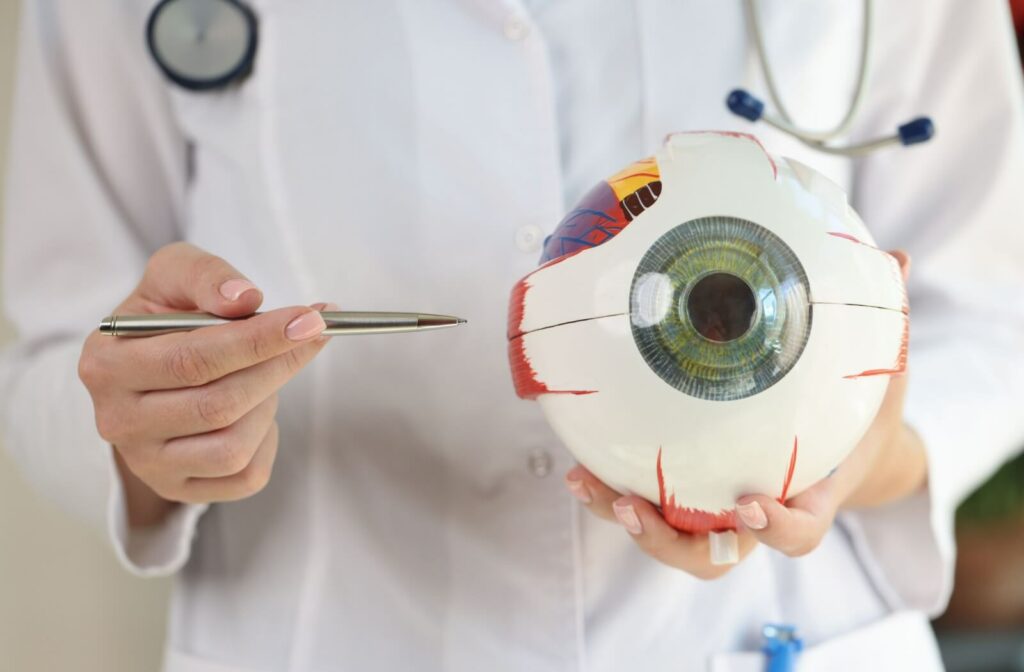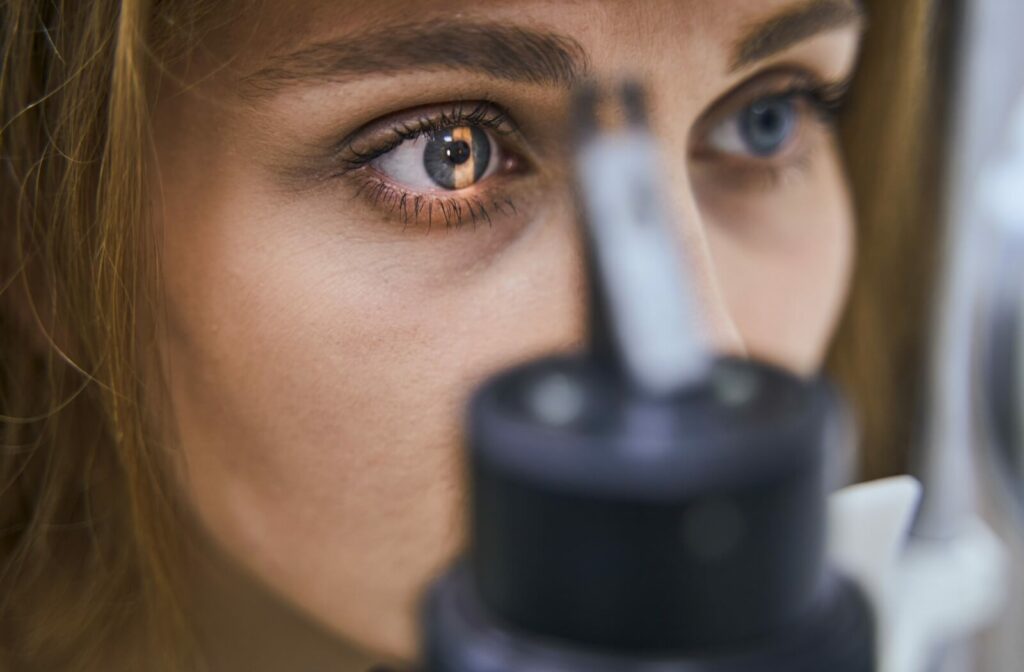Comprehensive eye exams can feel like unneeded healthcare when you don’t have vision problems. However, they are so much more than simple vision screening – your optometrist can detect early signs of diseases like age-related macular degeneration, cataracts, glaucoma, diabetes and more during a comprehensive eye exam.
Many eye diseases progress slowly, with no pain or symptoms until you notice your vision starts to change. Early identification is a crucial part of catching these warning signs early to help slow disease progress and prevent vision loss.
Diseases an Eye Exam Can Detect
1 in 7 Canadians have a vision threatening eye condition, but early intervention helps prevent 75% of vision loss. Depending on your age and possible risk factors, some of the diseases your optometrist can detect include:
Age-Related Macular Degeneration (AMD)
An eye disease that affects your central vision, which impacts your ability to drive, read, and recognize faces. Age-related Macular Degeneration or AMD is the leading cause of blindness in North America for age 50+ adults and happens when the macula deteriorates. Its telltale sign is blurry spots in the central vision and straight lines that appear wavy or curved.
You may be at a higher risk of developing AMD if you smoke, have high blood pressure, have a family history of AMD, or have repeated UV exposure. Utilizing sun protection like sunglasses and quitting smoking can help prevent AMD’s development.
Cataracts
When the clear lens of your eye hardens, forms a cloudy buildup, and becomes opaque. While many people can live with cataracts, in its advanced stages it can obscure vision and make daily tasks difficult to accomplish. Its telltale signs include halos around lights, foggy or blurry vision, light sensitivity, and experiencing dull, muted colours.
Eating a diet high in vitamin C & E, quitting smoking, and wearing UV protective sunglasses can help delay the onset and progression of cataracts. Mild vision loss from cataracts can be corrected with glasses and contact lenses but advanced stages of cataracts may require surgical removal.
Diabetes
Diabetes increases your risk of developing eye diseases. The most serious (and common) complications include diabetic retinopathy and diabetic macular edema, which can permanently damage your eyes. Fortunately, diabetes can be detected through a comprehensive eye exam before a diagnosis of the condition.
Glaucoma
There are several types of glaucoma, but it’s characterized by damage to the optic nerve from pressure built up inside of the eye. Glaucoma is often known as the “silent thief of vision” because its progression is slow and symptom-free, which makes regular comprehensive eye exams key to detecting early.
Once symptoms do start to appear, they typically impact peripheral vision first, causing patchy or blind spots (and eventually tunnel vision). If you start experiencing sudden onset headaches, blurry vision, eye redness, or halos appearing around lights, you should call your optometrist immediately.
And Many Others…
Whether it’s inflammation of the arteries, swelling, light-sensitivity, or pain, your eyes can give warning signs for many more surprising diseases, including:
- Giant Cell Arteritis
- Lupus
- Lyme Disease
- Multiple Sclerosis
- Rheumatoid Arthritis
- Sarcoidosis
- Sickle Cell Disease
Other Health Problems an Eye Exam Can Detect

Comprehensive eye exams look at the entire eye and its visual system, not just your prescription, which makes it an important aspect of preventative health care for your eyes. Beyond detecting serious diseases, eye exams can detect systemic health problems like:
- Brain injuries, including neurological conditions like a risk of stroke, noticed by blockages or clots in the blood vessels of the retina
- Brain & eye tumors, which can cause increased pressure & swelling near the back of the eye or cause changes to the optic nerve
- High cholesterol, which can cause a yellow or blue ring around the cornea
- Hypertension, or high blood pressure, can cause atypical bends, kinks, or bleeding from blood vessels in the back of the eye
- Medication toxicities, through which some drugs can be toxic to the retina & optic nerve, usually noticeable through red eyes & eyelids, scratchy corneas, or conjunctivitis
- Vitamin A deficiency, which causes dry eyes and night blindness and is one of the leading causes of preventable blindness in children
An Eye Exam Can Detect All That?
Yes! Our bodies are incredible, interconnected systems that can give us warning signs of illnesses in unexpected places. Which is why a comprehensive eye exam is more than just reading letters off a stereotypical eye exam chart.
- Analyzing your visual needs at home, work, school, & general life
- Measuring the visual acuity of your eyes (individually & together)
- Assessing your binocular vision status, including eye alignment, eye movements, coordination, focusing ability, depth perception, & hand-eye coordination
- Including neurological assessment of pupil reactions, peripheral vision, and ocular motility
- Utilizing a biomicroscope to check the interior of your eyes for disease & illness conditions (mentioned above)
- Checking the external structure of the eyes for conditions like dry eye, pink eye, lumps on the eyelids, etc.
Even more testing can be done to provide more in-depth assessments if needed – either to rule out potential problems or clarify unusual results.
How Frequently Should I Get My Eyes Tested?
If you do not have any vision issues or health conditions, an eye exam every two years (at minimum) is more than enough, though you should speak to your optometrist if you have any specific concerns. Any adult who regularly wears glasses or contact lenses should consider more frequent eye exams to stay on top of your prescription needs and adults over 65 should get annual exams.Advance Eye Care Centre also offers customized eye exam schedules for anyone with diabetes, high myopia, or other vision conditions. No matter what state your eyes are currently in, contact us today to set up your next comprehensive eye exam.





